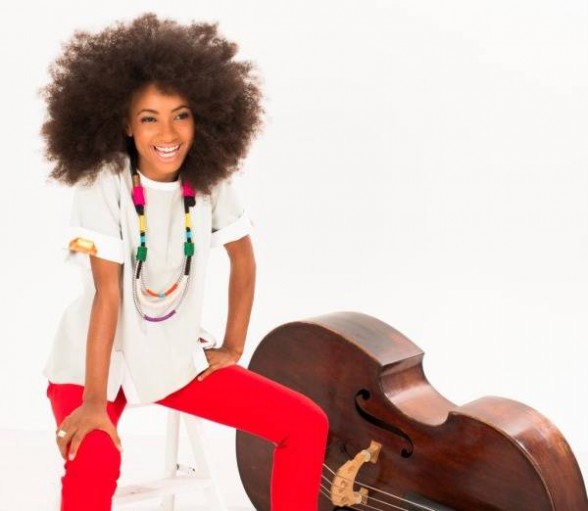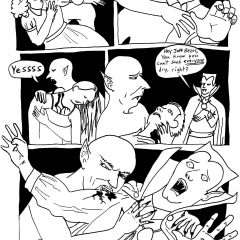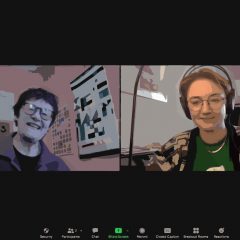[After interviewing musician Esperanza Spalding recently, Donald attended her concert. He presents the highlights here. — the Artblog editors]
If it ain’t fun, why do it? That’s what Esperanza Spalding admitted to the Keswick Theatre audience, thanks to the man who originally said this: Wayne Shorter. Spalding, a multiple Grammy Award-winning bassist, vocalist, and composer, made a stop at the Keswick in Glenside, PA as part of her “Thank You October” tour. This concert played as a retrospective of sorts for a musician who has accomplished so much in such a short amount of time.
Keyboardist Leo Genovese and drummer Lyndon Rochelle joined Spalding for the concert, providing a tight-knit trio (or quartet, if you count Spalding’s vocals) for the 90-minute set. Spalding came out and announced to the audience: “We’re gonna start at the beginning.” The beginning for Spalding is her hometown of Portland, Oregon, for which she wrote a song entitled “City Of Roses”. This song appeared on her previous effort, Radio Music Society, and won the Grammy Award for Best Instrumental Arrangement Accompanying Vocalist(s).
Captivating covers

Spalding then asked the audience: “What is your mental illness, and why does it have to manifest itself on me?” This led into “She Got To You,” a song that addresses the irritating aspects of a one-sided relationship. Aside from being one of the most polished musicians anywhere, Spalding has an engaging personality and stage presence to match. She pokes fun at her dancing inability (although she moves just fine), tells fascinating stories, and makes her audience feel like extended family members.
Some of her best performances happened to be covers: Wayne Shorter’s “Endangered Species” and the Stevie Wonder-penned “I Can’t Help It,” which was originally recorded by Michael Jackson and featured on his landmark album Off the Wall. “Endangered Species” is a bit of an obscure piece that Spalding updated with her own lyrics and interpretation. It’s an insular and complex piece that requires an involved listener to move with the trio as they move into each direction throughout. “I Can’t Help It” fits like a glove for Spalding. When she uttered the opening line, the audience went, “Yeah,” as the song felt so right coming from this strong, beautiful young woman.

The coolest touch of the concert had to be during “Chacarera”. The song shows off Spalding’s wide-ranging vocal instrument; it appears on Chamber Music Society, an album I consider to be her most cohesive to date. The trio displayed that cohesiveness perfectly as the song transitioned into “Wild Is The Wind,” the same song it leads to on the album. It was great to hear these songs performed with piano, bass, and drums, as the album versions relied heavily on string players.
Spalding dedicated the soulful and captivating “Cinnamon Tree” to Jef Lee Johnson, a Philadelphia-based guitarist who played in her band and was a mentor for her up until his passing in 2013.
Spirit and seduction
The latter songs were Spalding’s signature tunes: “Black Gold” and “I Know You Know”. “Black Gold” is a song with great social importance, as it is a song about black men being comfortable in their own skin. “I Know You Know” is a playful love song with a seductive Latin groove.

The encore was “I Adore You,” a song that Spalding has seldom performed. If you close your eyes, the song transports you to Cuba. Spalding got the audience (or her choir) involved with some call-and-response. She started off with a simple melody and the audience confidently responded the melody to her. Gradually, the licks she threw out there were impossible for audience members who didn’t quite have the aural training required to imitate them. The result found the audience members laughing at themselves as it got them involved. For much of the evening, the audience seemed to take it all in and stay introverted.
Spalding is proof that there is still an awful lot of great music to be heard, despite what music cynics say. She is the future of jazz music, just like Miles Davis and Charlie Parker were in their prime. Spalding could easily rest on her laurels, being the first jazz artist ever to win Best New Artist at the Grammy Awards, but she’s not. She keeps seeking the next phase in her music-making, and we’re with her every step of the way.
For more information on Esperanza Spalding, visit her website here.









